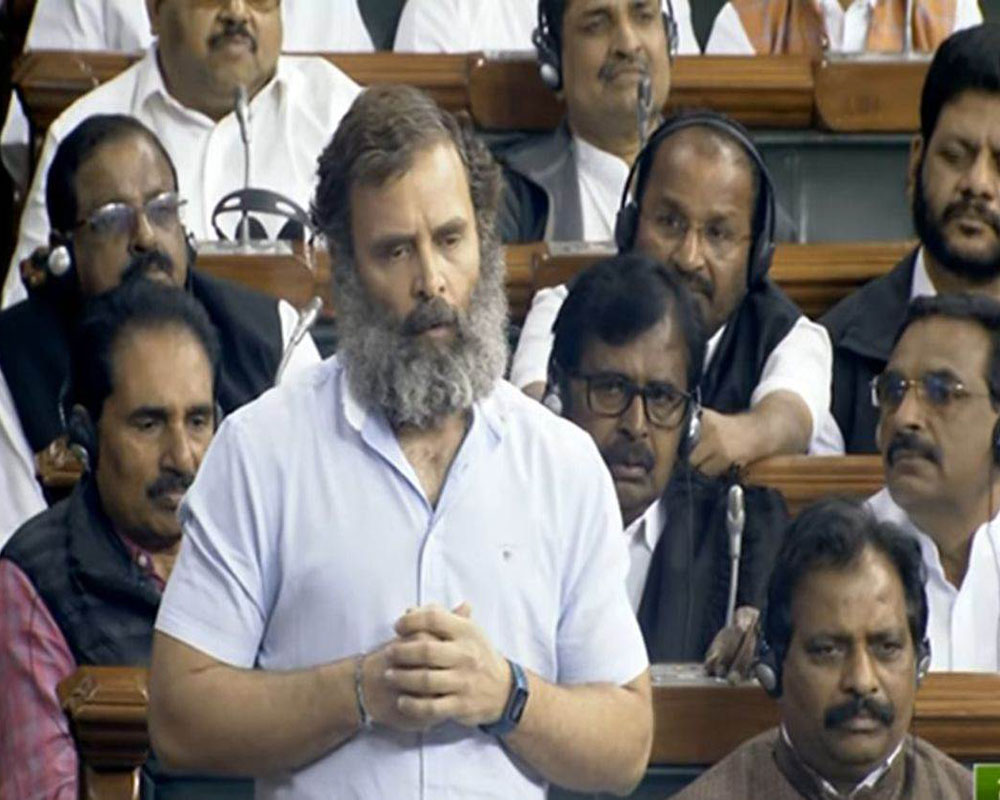The comments from the US Govt on an internal matter of India are uncalled for. India is an old democracy and knows how to deal with its internal issues
Is it not unfortunate that the governments of the USA and Germany have commented on the compaction of Rahul Gandhi by a court of law in Surat, followed by his being disqualified from Parliament’s membership? Crossing international borders to connect on happenings in another country is inappropriate diplomacy, to say the least. Not minding one’s business is misbehaviour. To do this internationally is a violation of another country’s sovereignty.
Germany is a very young democracy that took birth only after World War I, which is when the Weimar Republic came into being, before being shoved under by the Nazis. But American democracy is about two and a half centuries old. For the US State Department to make such a mistake is unforgivable, more so when its current President is going out of his way to laud India as an indispensable ally in Asia.
The first principle of democracy is to have deference for the views and feelings of others. Without this, democracy cannot endure. Democracy in modern times began when Runnymede, King John of England in 1215 AD signed the Magna Carta, establishing the concept of rule of law.
This meant that all citizens are equal before the law, which also means one citizen does not interfere in the affairs of another, unjustifiably. By the same token, one nation ought not to interfere in the affairs of another. This, in turn, means each country must respect the sovereignty of another. Otherwise, it is tantamount to opening a bottle having the scent of war. The victory in World War II showered hubris on the American establishment; they felt qualified to dictate policy to the world. In 1953, the independent Iranian government asked the Anlo-Iranian to audit their books through local auditors. The UK as well as the USA were offended by this order of the Iranian state and engineered a toppling of the nationalist government of Mohammed Mossadegh. The Western powers replaced him with the regime of Iran’s monarchy of Shah Mohammad Reza Pahlavi. This regime had to survive solely on Anglo-American support till 1979 when the Ayatollah Khomeini Revolution took place.
The next American intervention was in 1983 under President Ronald Reagan, under the pretext of protecting American nationals against a Marxist regime on that Caribbean Island. The USA has also intervened militarily in Korea and Vietnam to prevent the spread of communism. It intervened twice in Iraq in 1991 and then in 2003, overthrowing Saddam Hussein, another nationalist leader in the Arab world who had defied the Americans.
One can praise the United Kingdom for having systematically developed internal democracy. But when it came to the outside world, London adopted double standards. It treated Asia and Africa as free playing fields of its imperialist designs, which led to its rise as well as fall. Britain’s leaders saw no wrong in invading, ruling and exploiting other countries with gay abandon. The results of this double standard are there for everyone to see today.
In contrast, is Germany. Not that it did not want any colonies but it failed to capture and hold any except Tanganyika for a while. Yet it achieved enough to become today the fourth largest economy in the world. In great contrast, India has kept away from imperialistic adventures. It has itself been a victim of imperial adventures from the invasion of Mohammad bin Qasim in 712 AD to its independence from imperial Britain in 1947. Yet, it continues to stand on its own as the world’s fifth-largest economy and the fastest-growing one.
India has known democracy since ancient times. Before the series of foreign invasions, there were several republics in ancient India; notably, the Sakyas, Koliyas, Vaishali, Ghratvikas, Mallas, Bhagyas, Kalamas and so on. However, what comes to mind the most is the very ancient Shurasena (on the federacy of Mathura and later Dwaraka, whose president, an elected one at that, was none other than Lord Krishna.
That Krishna was a historical figure is no longer in doubt. Dr Shobha Mukherji, who taught at Lucknow University, entitled The Republican Trends in Ancient India, published by Munshiram Manoharlal (1969), has substantiated the historicity of Krishna millennia ago. Dr Mukherji has traced the history of ancient Indian republics that co-existed with large, straddling empires though not always happily, and that of the Shurasena Confederacy, as the Yadava republic was known. Republican Trends in Ancient India has ample historical references to the existence of smaller, self-governing republics in Krishna’s time and the later periods of Indian history. Krishna’s leadership of his people and the existence of the Andhakas and Vrishnis (Krishna’s sub-clan) after his era are historical facts too, borne out by research in this book, which also provides a glimpse into the republican ideas on governance and statecraft.
It is difficult to overlook American history and President James Monroe’s Monroe Doctrine. This theory declared that the New World or the Americas was an American garden, which could be tended only by the USA. No country from the Old World, i.e., Europe, should interfere. If and when repairs were required to the fences of any part of the garden, meaning any country in the New World, it was America’s right to do so.
(The writer is a well-known columnist, an author and a former member of the Rajya Sabha. The views expressed are personal)


























